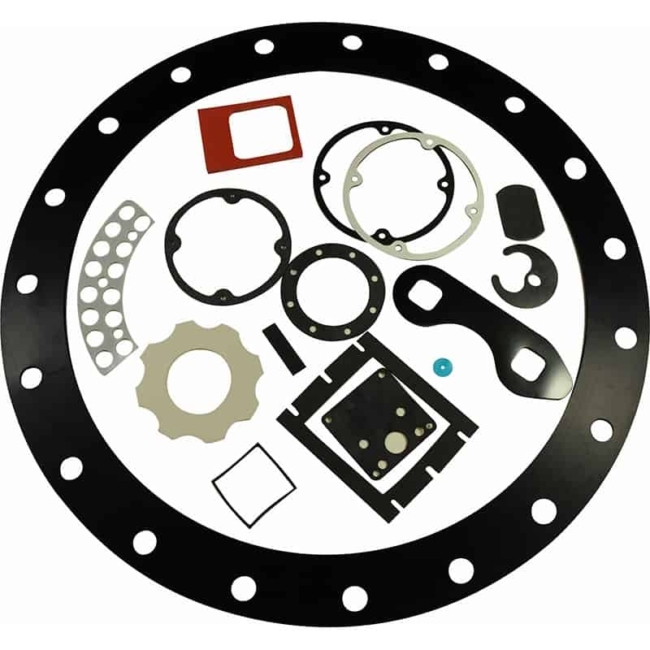Hypalon Gasket

Advanced Seals & Gaskets Ltd work with a host of manufacturers allowing us to produce gaskets using a variety of materials including Hypalon rubber. Our Hypalon gaskets are produced in-house, meaning we can manufacture bespoke items to match our customer's samples or drawings, from simple rectangular picture frame gaskets, to a more complex shape with cut-outs, notches or bolt holes, whether it’s a small sample batch or a multi-thousand run, we have a machine designed to quickly and accurately produce perfectly formed gaskets every time which include a selection of presses, kiss cut machines and our oscillating knife.
What are Hypalon Rubber Gaskets?
Hypalon rubber is a high-quality synthetic material also referred to as chlorosulfonated polyethylene, produced by combining and reacting polyethylene with chlorine and sulfur dioxide, this reaction changes the thermoplastic polyethylene into a synthetic elastomer which can then be compounded and vulcanised to produce the finished material.
Hypalon rubber gaskets sometimes come in the form of a strip or pad but are generally an intricately cut shaped piece of material placed between two surfaces to create a low-pressure seal preventing the leakage of liquids or gas and to seal against the intrusion of dust and debris.
Product Enquiry
For information on Hypalon Gasket please complete the following quick enquiry or call us on +44(0)1384 252555.
Product Specification & Key Characteristics
- Colour: Black
- Shore Hardness: 65°
- Working temperature range: -30°C to +140°C.
- Resistances: UV, weather, extreme temperatures, chemicals, oils
- High tensile strength and self - extinguishing
- Thicknesses: manufactured from 1mm or bespoke mouldings
Full technical data can be supplied upon request,
or downloaded from our online portal.
Why use Hypalon Rubber Gaskets?
Hypalon gaskets are most often used as a type of seal, where they can create air or liquid-tight seals, as gap fillers for uneven surfaces, reduce friction between moving parts and can absorb vibration, especially when used to connect objects with hard surfaces where there is a lot of movement.
Hypalon gaskets have excellent resistance to ozone, weathering and acids, with exceptional resistance to chemicals and oils and very high or low temperatures, an operating temperature range of -30℃ to +140℃ and high tensile strength.
By combining the two compounds in the material manufacturing process, Hyplon demonstrates the moisture resistance, good dielectric strength and chemically inertness of standard polyethylene, with the oil and self-extinguishing fire resistance properties produced with the addition of chlorine.
Advantages of Hypalon Rubber Gaskets
Using Hypalon rubber to manufacture gaskets offers a number of excellent qualities which include its chemical inertness, resistance to ozone, weathering and oils, wide operating temperature range, good dielectric strength and self-extinguishing properties.
Hypalon rubber is usually manufactured in continuous rolls which can later be cut and converted into bespoke gaskets, however being a solid rubber, they can also be moulded into specific shapes.
Applications in which Hypalon rubber is often found include automotive hoses and seals, hydraulic sealing, cable construction and housing and incorporated into roofing systems.
Benefits of Using Hypalon Gaskets
- Excellent ozone and weather resistance
- Resistance to aggressive chemicals, abrasion and mechanical impact or friction
- Good resistance to oil and solvents
- Wide working temperature range
- Electrical insulation properties
- Low flammability
Please contact us using the form below or by calling us on +44(0)1384 252555.





















